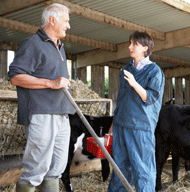Update on AHVLA's new surveillance approach

Seven AHVLA surveillance sites are set to close between now and April 2015.
An update has been issued on AHVLA plans to develop a new approach to surveillance for new and re-emerging animal diseases and other animal threats in England and Wales.
In December last year, the agency and the Welsh Government announced plans to introduce a new approach, based on recommendations from an independent group.
Key changes include the closure of a number of AHVLA post-mortem examination (PME) facilities. For a period of three years, a carcass collection and transport service will be introduced in areas where post-mortem facilities have been withdrawn.
In addition, the agency says it aims to place greater emphasis on gathering and analysing information from industry and academic sources - to ensure new and re-emerging disease threats are identified and investigated early on.
Following a supplier day held by the agency in January, invitations to tender for provision of PME will be issued by the end of this month. Providers are expected to begin supplying this service by September 2014.
Likewise, invitations to tender for carcass transport services will be sent by the end of the month and implemented by September this year.
This service will be introduced in areas where local AHVLA surveillance centres are closing, with no alternative providers.
Surveillance sites in Truro, Luddington, Preston and Newcastle are set to close before September. The agency says a temporary local carcass collection service will be introduced or continued in these areas.
Sites in Sutton Bonington and Langford, Somerset will continue to operate until September 2014, while the Winchester site will remain open until April 2015.
After a recent meeting with several representatives from veterinary businesses, universities and the Royal College of Pathology, the agency concluded that improving the diagnostic and post-mortem skills of private vets is essential to increasing access to diagnostic services for farmers.
The group discussed a range of training options, including online modules and practical and theoretical courses. Over the next few weeks, a survey will be launched to assess the demand for these courses from private vets and to better understand what training is needed specifically.
As part of the agency's 2014 surveillance project, species specific submission forms and a revised submission booklet will be available next month. In addition, private vets will have access to a new online self-service submissions portal within the next 12-18 months. However, they will still be able to telephone AHVLA veterinary investigations officers for advice.
Finally, the creation of the Surveillance Intelligence Unit will help the AHVLA to explore the available data and determine which may be useful for identifying threats early. A Surveillance Board for England and Wales will be created to oversee the efficacy of the surveillance model.
For further information, visit the AHVLA website.



 The Veterinary Medicines Directorate (VMD) is inviting applications from veterinary students to attend a one-week extramural studies (EMS) placement in July 2026.
The Veterinary Medicines Directorate (VMD) is inviting applications from veterinary students to attend a one-week extramural studies (EMS) placement in July 2026.